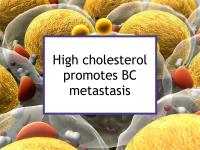Cholesterol is a waxy, fat-like substance found throughout the body. Total cholesterol consists primarily of high-density lipoprotein (HDL, the "good" cholesterol), low-density lipoprotein (LDL, the "bad" cholesterol), and triglycerides. There is evidence that a poor cholesterol profile can accelerate breast tumor formation and growth.
Now a new study has reported that high LDL facilitates metastasis by promoting vascular invasion of breast cancer cells.
Cholesterol and breast cancer
Dietary cholesterol has been shown to promote and accelerate mammary tumor formation in mice. Mice fed a high cholesterol diet in one study developed larger tumors that were faster growing and metastasized more easily compared to mice on a control diet. Normal breast cells respond to oxidized LDL by increasing proliferative and pro-inflammatory signaling, thereby setting the stage for breast cancer development. Breast cells have the propensity to accumulate cholesterol. Tamoxifen works, in part, by reducing cholesterol.
Population studies have also found a link between high cholesterol and increased breast cancer risk. However, high levels HDL as well as of LDL have been found to be associated with increased breast cancer risk. Blood cholesterol levels are reduced during tumor development because of increased use of cholesterol by tumors. In fact, there is evidence that low cholesterol is also associated with breast cancer, possibly because undiagnosed tumors are already using cholesterol. Use of statins to treat high cholesterol has been shown to lessen breast cancer rates in some women.
Latest research finds high LDL promotes metastasis
The study referenced above was designed to investigate the mechanism of action by which high LDL cholesterol increases risk of breast cancer metastasis. As the authors point out, most breast cancer metastasis results from the dissemination of tumor cells through the bloodstream. How tumor cells actually make their way into the blood (intravasation) is poorly understood.
To conduct the study, the authors first demonstrated that a high cholesterol diet promoted intravasion and metastasis in two mouse models of breast cancer. They then showed that this could be reversed by blocking the binding of LDL to the LDL receptor (LDLR) in tumor cells. Furthermore, the authors showed that LDL promoted vascular invasion in breast cancer cells and other changes previously shown to be needed for intravasation. Finally, the authors demonstrated that blocking LDL from binding to LDLR prevented the increase in lung metastasis in the mice brought on by the high cholesterol diet.
The authors conclude that they have demonstrated new findings with respect to how systemic hypercholesterolemia might affect the onset of metastatic breast cancer by inducing changes in breast cancer cells and promoting intravasation.
